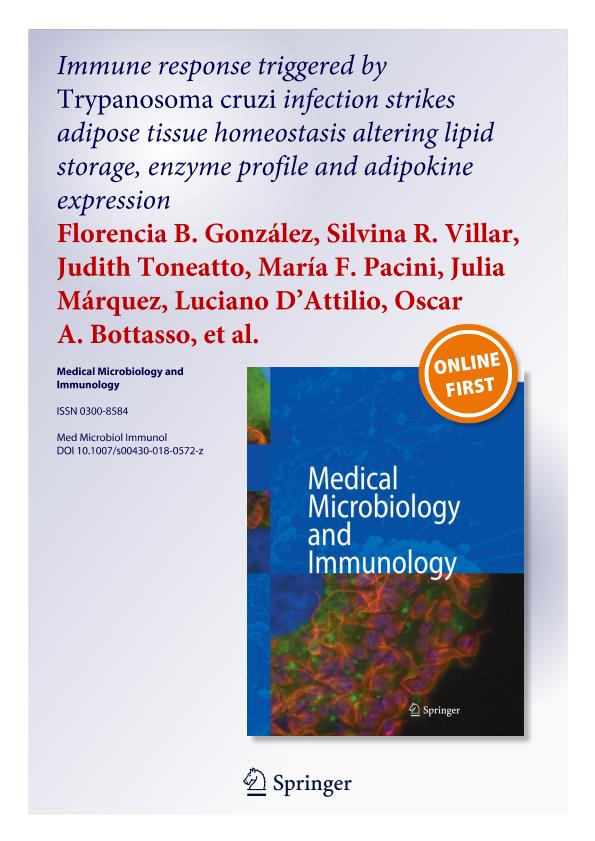Artículo
Immune response triggered by Trypanosoma cruzi infection strikes adipose tissue homeostasis altering lipid storage, enzyme profile and adipokine expression
González, Florencia Belén ; Villar, Silvina Raquel
; Villar, Silvina Raquel ; Toneatto, Judith
; Toneatto, Judith ; Pacini, María Florencia
; Pacini, María Florencia ; Márquez, Julia; D'attilio, Luciano David
; Márquez, Julia; D'attilio, Luciano David ; Bottasso, Oscar Adelmo
; Bottasso, Oscar Adelmo ; Piwien Pilipuk, Graciela
; Piwien Pilipuk, Graciela ; Perez, Ana Rosa
; Perez, Ana Rosa
 ; Villar, Silvina Raquel
; Villar, Silvina Raquel ; Toneatto, Judith
; Toneatto, Judith ; Pacini, María Florencia
; Pacini, María Florencia ; Márquez, Julia; D'attilio, Luciano David
; Márquez, Julia; D'attilio, Luciano David ; Bottasso, Oscar Adelmo
; Bottasso, Oscar Adelmo ; Piwien Pilipuk, Graciela
; Piwien Pilipuk, Graciela ; Perez, Ana Rosa
; Perez, Ana Rosa
Fecha de publicación:
11/2018
Editorial:
Springer
Revista:
Medical Microbiology and Immunology
ISSN:
0300-8584
Idioma:
Inglés
Tipo de recurso:
Artículo publicado
Clasificación temática:
Resumen
Adipose tissue is a target of Trypanosoma cruzi infection being a parasite reservoir during the chronic phase in mice and humans. Previously, we reported that acute Trypanosoma cruzi infection in mice is linked to a severe adipose tissue loss, probably triggered by inflammation, as well as by the parasite itself. Here, we evaluated how infection affects adipose tissue homeostasis, considering adipocyte anabolic and catabolic pathways, the immune–endocrine pattern and the possible repercussion upon adipogenesis. During in vivo infection, both lipolytic and lipogenic pathways are profoundly affected, since the expression of lipolytic enzymes and lipogenic enzymes was intensely downregulated. A similar pattern was observed in isolated adipocytes from infected animals and in 3T3-L1 adipocytes infected in vitro with Trypanosoma cruzi. Moreover, 3T3-L1 adipocytes exposed to plasmas derived from infected animals also tend to downregulate lipolytic enzyme expression which was less evident regarding lipogenic enzymes. Moreover, in vivo-infected adipose tissue reveals a pro-inflammatory profile, with increased leucocyte infiltration accompanied by TNF and IL-6 overexpression, and adiponectin downregulation. Strikingly, the nuclear factor PPAR-γ is strongly decreased in adipocytes during in vivo infection. Attempts to favor PPAR-γ-mediated actions in the adipose tissue of infected animals using agonists failed, indicating that inflammation or parasite-derived factors are strongly involved in PPAR-γ inhibition. Here, we report that experimental acute Trypanosoma cruzi infection disrupts both adipocyte catabolic and anabolic metabolism secondary to PPAR-γ robust downregulation, tipping the balance towards to an adverse status compatible with the adipose tissue atrophy and the acquisition of an inflammatory phenotype.
Palabras clave:
3T3-L1
,
ADIPOCYTES
,
ADIPOSE TISSUE
,
CHAGAS DISEASE
,
PPAR-Γ
,
TRYPANOSOMA CRUZI
Archivos asociados
Licencia
Identificadores
Colecciones
Articulos(IBYME)
Articulos de INST.DE BIOLOGIA Y MEDICINA EXPERIMENTAL (I)
Articulos de INST.DE BIOLOGIA Y MEDICINA EXPERIMENTAL (I)
Articulos(IDICER)
Articulos de INSTITUTO DE INMUNOLOGIA CLINICA Y EXPERIMENTAL DE ROSARIO
Articulos de INSTITUTO DE INMUNOLOGIA CLINICA Y EXPERIMENTAL DE ROSARIO
Citación
González, Florencia Belén; Villar, Silvina Raquel; Toneatto, Judith; Pacini, María Florencia; Márquez, Julia; et al.; Immune response triggered by Trypanosoma cruzi infection strikes adipose tissue homeostasis altering lipid storage, enzyme profile and adipokine expression; Springer; Medical Microbiology and Immunology; 208; 5; 11-2018; 651-666
Compartir
Altmétricas



